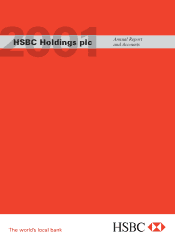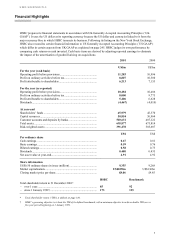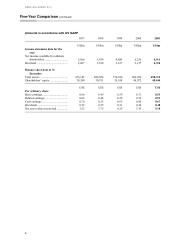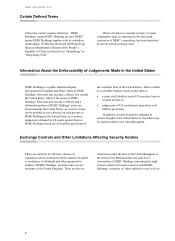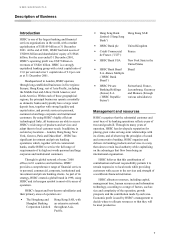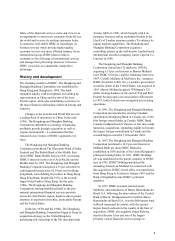HSBC 2001 Annual Report Download - page 7
Download and view the complete annual report
Please find page 7 of the 2001 HSBC annual report below. You can navigate through the pages in the report by either clicking on the pages listed below, or by using the keyword search tool below to find specific information within the annual report.
HSBC HOLDINGS PLC
Cautionary Statement Regarding Forward-Looking Statements
5
This Annual Report contains certain forward-looking
statements with respect to the financial condition,
results of operations and business of HSBC.
Statements that are not historical facts, including
statements about HSBC’ s beliefs and expectations, are
forward-looking statements. Words such as ‘expects’ ,
‘anticipates’ , ‘intends’ , ‘plans’ , ‘believes’ , ‘seeks’ ,
‘estimates’ , ‘potential’ , ‘reasonably possible’ and
variations of these words and similar expressions are
intended to identify forward-looking statements.
These statements are based on current plans, estimates
and projections, and therefore undue reliance should
not be placed on them. Forward-looking statements
speak only as of the date they are made, and you
should not assume that they have been revised or
updated in the light of new information or future
events.
Written and/or oral forward-looking statements
may also be made in the periodic reports to the
Securities and Exchange Commission on Forms 6-K,
summary financial statements to shareholders, proxy
statements, offering circulars and prospectuses, press
releases and other written materials and in oral
statements made by HSBC’ s Directors, officers or
employees to third parties, including financial
analysts.
Forward-looking statements involve inherent
risks and uncertainties. Readers are cautioned that a
number of factors could cause actual results to differ,
in some instances materially, from those anticipated or
implied in any forward-looking statement. These
factors include, among others:
• changes in general economic conditions in the
markets where HSBC operates, such as:
− changes in foreign exchange rates, in both
market exchange rates (for example, between
the US dollar and the pound sterling) and
government-established exchange rates (for
example, between the Hong Kong dollar and
the US dollar);
− volatility in interest rates, including in Asia
and Latin America; and
− volatility in equity markets, including in the
smaller and less liquid trading markets in
Asia and Latin America.
• changes in governmental policy and regulation,
including:
− the monetary, interest rate and other policies
of central banks and bank regulatory
authorities, including the UK Financial
Services Authority, the Bank of England, the
Hong Kong Monetary Authority, the Board
of Governors of the US Federal Reserve
System, the European Central Bank, the
French Banking Commission and the central
banks of other leading economies or in
markets where HSBC operates;
− increased competition resulting from
legislation permitting new types of
affiliations between banks and financial
services companies, including securities
firms, particularly in the United States;
− expropriation, nationalisation, confiscation of
assets and changes in legislation relating to
foreign ownership;
− general changes in government policy that
may significantly influence investor
decisions in particular markets in which
HSBC operates; and
− other unfavourable political or diplomatic
developments producing social instability or
legal uncertainty which in turn may affect
demand for HSBC’ s products and services.
• the ability of the Government of Argentina
through reform of monetary, fiscal and exchange
rate policy to restore economic stability within the
country and thereby attracting international
support for the measures necessary to restructure
debt obligations and create a viable financial
system;
• the effects of competition in the markets where
HSBC operates. HSBC expects competition to
intensify as a result of, among other things,
technological advances and the introduction of the
euro; and
• the success of HSBC in adequately identifying
and managing the risks it faces (through hedging
and other techniques), which depends on, among
other things, its ability to anticipate events that
cannot be captured by the statistical models it
uses.
Trends and factors that are expected to
particularly affect HSBC’ s results of operations are
described in the ‘Financial Review’ .

